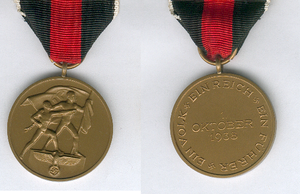置頂精選
:Wenck, Walther The Boy General
2014/09/07 16:48
瀏覽1,232
迴響0
推薦3
引用0
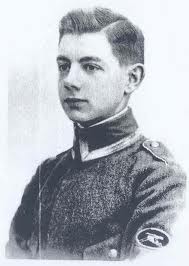
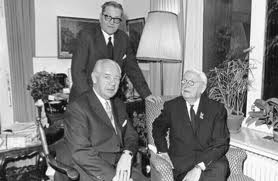
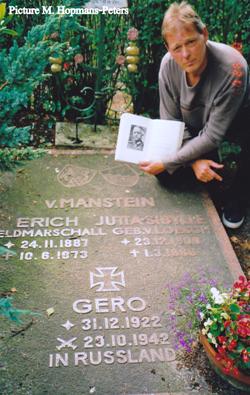
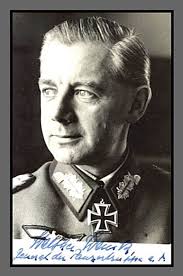
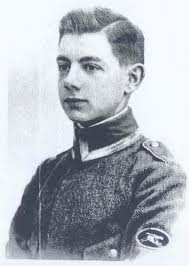
Walther "The Boy General".
- Wenck, Walther "The Boy General".
-
General der Panzertruppen, He commanded the German Twelfth Army.
- 18-09-1900, Wittenberg.
- Germany.
- 01-05-1982, age 81, in a car accident, Bad Rothenfelde.
-
Local cemetery od Bad Rothenfelde.
-
他曾經是蔣介石親點駐華首席軍事顧問 ??

Walther Wenck, born 18-09-1900 in Wittenberg, was the youngest General in the German Army during World War II. He lost two brothers in the first World War, Helmuth, age 19 on 27-03-1915 in Russia and Hans Ulrich, also age 19 on 09-04-1918 in France. Prior to joining the Army of the Weimar Republic in 1920, he was a member of the Free Corps, Freikorps in 1919. At the end of World War II, he commanded the German Twelfth Army. Wenck ordered his army to surrender to forces of the United States in order to avoid capture by the Soviets. Before surrendering, Wenck played an important, if unsuccessful, part in the Battle of Berlin. He was known during the war as "The Boy General". Prior to joining the Army, Reichswehr of the Weimar Republic in 1920, he was a member of the Free Corps, Freikorps, in 1919. From 1939 to 1942, Wenck was Chief of Operations for the First Panzer Division .
In 1942, he was an instructor for the War Academy, Chief of Staff for the LVII Corps, and Chief of Staff for the Third Romanian Army on the Eastern Front. Wenck stayed on the Eastern Front and, from 1942 to 1943, he was Chief of Staff of "Army Detachment Hollidt
Steiner commanding the 11th SS Panzer Army , this was one of the last major German tank offensives of the war. Approximately 300 German AFV's attacked Soviet positions in Pomerania. The operation was poorly planned and poorly supported, and ended in Soviet victory on 18 February. On 10-04-1945, as General of Panzer Troops, Wenck was made the commander of the German Twelfth Army located to the west of Berlin. On 21 April, Adolf Hitler ) ordered SS-General Felix Steiner to attack the forces of Soviet Marshal Georgy Zhukov's 1st Belorussian Front. Zhukov's forces were encircling Berlin from the north. The forces of Soviet Marshal Ivan Konev's 1st Oekrainian Front
.3 were encircling Berlin from the south. Steiner was to attack Zhukov with his Army Detachment Steiner. With few operational tanks and roughly a division's worth of infantry, Steiner declined to attack. Instead, he requested that his "army" be allowed to retreat to avoid its own encirclement and annihilation. On 22 April, as Steiner and Army Detachment Steiner retreated, Wenck's Twelfth Army became Hitler's last hope to save Berlin. Wenck was ordered to disengage the Americans to his west and, attacking to the east, link up with the Ninth Army of General der Infanterie, Theodor Busse ). Together, they would attack the Soviets encircling Berlin from the west and from the south. Meanwhile, the XLI Panzer Corps under Generalleutnant der Artillerie, Rudolf Holste ( would attack the Soviets from the north. Unfortunately for the Germans in Berlin, much of Holste's forces consisted of transfers from Steiner's depleted units. Wenck's army, only recently formed, did make a sudden turn around and, in the general confusion, surprised the Russians surrounding the German capital with an unexpected attack. Wenck's forces attacked towards Berlin in good morale and made some initial progress, but they were halted outside of Potsdam by strong Soviet resistance. Neither Busse or Holste made much progress towards Berlin. By the end of the day on 27 April, the Soviet forces encircling Berlin linked up and the forces inside Berlin were completely cut off from the rest of Germany. On 28 April, German General der Artillerie and Chief of Staff, Hans Krebs , made his last telephone call from the Führerbunker. He called General Field Marshal, Wilhelm Keitel at the new Supreme Command Headquarters in Fürstenberg. Krebs told Keitel that, if relief did not arrive within 48 hours, all would be lost. Keitel promised to exert the utmost pressure on Generals, Walther Wenck and
were encircling Berlin from the south. Steiner was to attack Zhukov with his Army Detachment Steiner. With few operational tanks and roughly a division's worth of infantry, Steiner declined to attack. Instead, he requested that his "army" be allowed to retreat to avoid its own encirclement and annihilation. On 22 April, as Steiner and Army Detachment Steiner retreated, Wenck's Twelfth Army became Hitler's last hope to save Berlin. Wenck was ordered to disengage the Americans to his west and, attacking to the east, link up with the Ninth Army of General der Infanterie, Theodor Busse ). Together, they would attack the Soviets encircling Berlin from the west and from the south. Meanwhile, the XLI Panzer Corps under Generalleutnant der Artillerie, Rudolf Holste ( would attack the Soviets from the north. Unfortunately for the Germans in Berlin, much of Holste's forces consisted of transfers from Steiner's depleted units. Wenck's army, only recently formed, did make a sudden turn around and, in the general confusion, surprised the Russians surrounding the German capital with an unexpected attack. Wenck's forces attacked towards Berlin in good morale and made some initial progress, but they were halted outside of Potsdam by strong Soviet resistance. Neither Busse or Holste made much progress towards Berlin. By the end of the day on 27 April, the Soviet forces encircling Berlin linked up and the forces inside Berlin were completely cut off from the rest of Germany. On 28 April, German General der Artillerie and Chief of Staff, Hans Krebs , made his last telephone call from the Führerbunker. He called General Field Marshal, Wilhelm Keitel at the new Supreme Command Headquarters in Fürstenberg. Krebs told Keitel that, if relief did not arrive within 48 hours, all would be lost. Keitel promised to exert the utmost pressure on Generals, Walther Wenck and
 were encircling Berlin from the south. Steiner was to attack Zhukov with his Army Detachment Steiner. With few operational tanks and roughly a division's worth of infantry, Steiner declined to attack. Instead, he requested that his "army" be allowed to retreat to avoid its own encirclement and annihilation. On 22 April, as Steiner and Army Detachment Steiner retreated, Wenck's Twelfth Army became Hitler's last hope to save Berlin. Wenck was ordered to disengage the Americans to his west and, attacking to the east, link up with the Ninth Army of General der Infanterie, Theodor Busse ). Together, they would attack the Soviets encircling Berlin from the west and from the south. Meanwhile, the XLI Panzer Corps under Generalleutnant der Artillerie, Rudolf Holste ( would attack the Soviets from the north. Unfortunately for the Germans in Berlin, much of Holste's forces consisted of transfers from Steiner's depleted units. Wenck's army, only recently formed, did make a sudden turn around and, in the general confusion, surprised the Russians surrounding the German capital with an unexpected attack. Wenck's forces attacked towards Berlin in good morale and made some initial progress, but they were halted outside of Potsdam by strong Soviet resistance. Neither Busse or Holste made much progress towards Berlin. By the end of the day on 27 April, the Soviet forces encircling Berlin linked up and the forces inside Berlin were completely cut off from the rest of Germany. On 28 April, German General der Artillerie and Chief of Staff, Hans Krebs , made his last telephone call from the Führerbunker. He called General Field Marshal, Wilhelm Keitel at the new Supreme Command Headquarters in Fürstenberg. Krebs told Keitel that, if relief did not arrive within 48 hours, all would be lost. Keitel promised to exert the utmost pressure on Generals, Walther Wenck and
were encircling Berlin from the south. Steiner was to attack Zhukov with his Army Detachment Steiner. With few operational tanks and roughly a division's worth of infantry, Steiner declined to attack. Instead, he requested that his "army" be allowed to retreat to avoid its own encirclement and annihilation. On 22 April, as Steiner and Army Detachment Steiner retreated, Wenck's Twelfth Army became Hitler's last hope to save Berlin. Wenck was ordered to disengage the Americans to his west and, attacking to the east, link up with the Ninth Army of General der Infanterie, Theodor Busse ). Together, they would attack the Soviets encircling Berlin from the west and from the south. Meanwhile, the XLI Panzer Corps under Generalleutnant der Artillerie, Rudolf Holste ( would attack the Soviets from the north. Unfortunately for the Germans in Berlin, much of Holste's forces consisted of transfers from Steiner's depleted units. Wenck's army, only recently formed, did make a sudden turn around and, in the general confusion, surprised the Russians surrounding the German capital with an unexpected attack. Wenck's forces attacked towards Berlin in good morale and made some initial progress, but they were halted outside of Potsdam by strong Soviet resistance. Neither Busse or Holste made much progress towards Berlin. By the end of the day on 27 April, the Soviet forces encircling Berlin linked up and the forces inside Berlin were completely cut off from the rest of Germany. On 28 April, German General der Artillerie and Chief of Staff, Hans Krebs , made his last telephone call from the Führerbunker. He called General Field Marshal, Wilhelm Keitel at the new Supreme Command Headquarters in Fürstenberg. Krebs told Keitel that, if relief did not arrive within 48 hours, all would be lost. Keitel promised to exert the utmost pressure on Generals, Walther Wenck and During the night of 28 April, Wenck reported to the German Supreme Army Command in Fuerstenberg that his Twelfth Army had been forced back along the entire front. This was particularly true of XX Corps which had been able to establish temporary contact with the Potsdam garrison. According to Wenck, no attack on Berlin was now possible. This was even more so as support from Busse's Ninth Army could no longer be expected. Late in the evening of 29 April, Krebs contacted General, Alfred Jodl ) by radio: "Request immediate report. Firstly of the whereabouts of Wenck's spearheads. Secondly of time intended to attack. Thirdly of the location of the Ninth Army. Fourthly of the precise place in which the Ninth Army will break through. Fifthly of the whereabouts of General Rudolf Holste's spearhead." In the early morning of 30 April, Jodl replied to Krebs: "Firstly, Wenck's spearhead bogged down south of Schwielow Lake. Secondly, Twelfth Army therefore unable to continue attack on Berlin. Thirdly, bulk of Ninth Army surrounded. Fourthly, Holste's Corps on the defensive." Wenck's eastward attack toward Berlin was aimed specifically at providing the population and garrison of Berlin with an escape route to areas occupied by United States armed forces: Comrades, you've got to go in once more," Wenck said. "It's not about Berlin any more, it's not about the Reich any more." Their task was to save people from the fighting and the Russians. Hans-Dietrich Genscher,

你可能會有興趣的文章:
